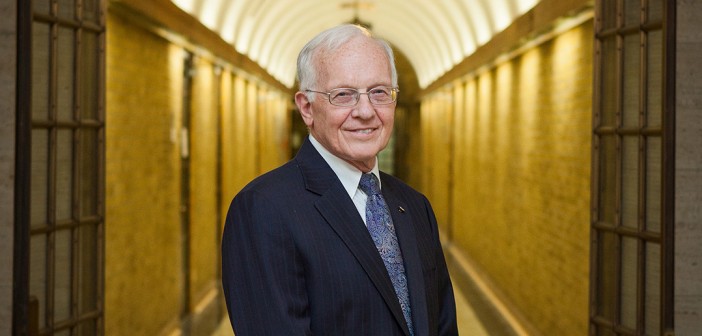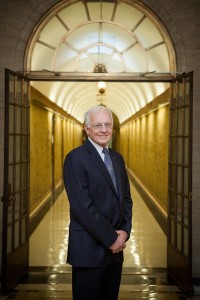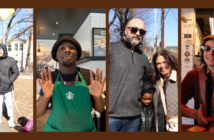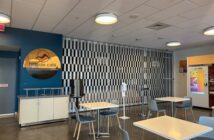It never occurred to Paul Corkum, ’72, during his time at Lehigh that anyone would consider him a candidate for the Nobel Prize. To him the idea seemed distant, as if such an honor could never be accessible. Corkum attended Lehigh in 1965 as a graduate student to complete a master’s degree and doctorate in physics, and stayed an additional year as an instructor. Earlier this year Corkum was nominated as candidate for the Nobel Prize for his work in producing and measuring attosecond pulses, but he did not win. An attosecond is described as what a second is to 31.7 billion years. The Brown and White sat down with Corkum to discuss his work and experiences.
Q: What did your research involve that made you a likely winner for the Nobel Prize?
Paul Corkum: Although they award the prize to a person, it’s really awarded to a field of science. And the field is making the fastest measurements possible, pushing measurement right to the extreme, as fast as you can go. So how do you make fastest measurements? It’s a bit like you can imagine a race. You fire a pistol, everybody starts to run and you take a picture at the end. Or you might take pictures along the way and watch the progress, like a movie for example. And making fast measurements is much the same. So you need a very fast starting pistol that has to be a laser pulse, and you need a very fast camera. And so my work was to make the very fast laser pulse and that actually implies a very fast camera. So these are record short pulses that can be made now. And my research led to record short pulses. If you could imagine it is really important because you see nature at its very fastest. We can measure so fast that you could watch an electron as it moves around a molecule. Maybe next year they will say making the fastest instrument in the world deserves the Nobel Prize, we will have to see.
Q: What was your defining moment in your career that helped you achieve this candidacy?
PC: I remember it started about 20 years ago, and I published a paper that explained how you make these short pulses, it was a proposal in a way. I don’t know if it was one day I sort of knew, but I began to realize how you might do this. And that was truly exciting because I understood this would allow the shortest pulses in the world — this would be the fastest measurement, and I have figured out how to do it. I tell people that it’s equivalent to go to the top of a mountain and ski down the mountain as fast as you dare. That’s how I think it is. That’s the intellectual version of it. So trying to figure out how to do something nobody has ever done.
Q: How do you feel your time at Lehigh helped to prepare your research and ultimately the candidacy?
PC: What you do when you are a student at any place is you learn the field. It’s like being a baseball player, you’ve got to learn to pitch, to hit and all of those things, and you learn those before you make it to the big leagues. That is exactly what you do when you are a student. You learn the subject, you learn as much as you can know about physics. But also you learn how to do research. I did learn about lasers at Lehigh, but I learned how to do the subject like a baseball player learns. You spend time learning your craft and eventually you write your novel. You’ve got to work your way up, you learn the techniques and the university prepares you for that, so that is what it did for me.
Q: Though you may not have won the prize do you still feel the same pride as if you did?
PC: Where it has really made a difference is to my family and social friends. In Canada, the Thompson Writers had made this prediction that made the news. So my sister-in-law turned on the radio in the morning and the first thing she heard was, “Paul Corkum is a potential Nobel Prize winner.” You could imagine the emails that went out to the family after that. So all of a sudden my family knew something they couldn’t really evaluate before because they are not scientists, so how do they know how important this is? And all of a sudden on the national news was this. Of course this makes a huge impact on your family. I got almost all of the benefit of the Nobel Prize just by being on the list.
Q: What is the next step in your career and research?
PC: You never finish, of course. We are trying to improve the source so you can still see faster things, and that is one thing. These experiments are built like a race with a starting pistol and a camera. But it isn’t quite like a camera — it’s like a camera but the image is indistinct. You find a way of measuring how the runners are moving but you can’t quite see them, I would like to bring the image back. And a lot of people are working on that and I have many ideas on it I have been working on this for a while but I would like to make it better and better — so maybe we can take a picture of electrons moving around. So that is one of the big things we are working on. The other thing is we have done a lot of work in gasses like in the air we breathe. Those are two big directions.







Comment policy
Comments posted to The Brown and White website are reviewed by a moderator before being approved. Incendiary speech or harassing language, including comments targeted at individuals, may be deemed unacceptable and not published. Spam and other soliciting will also be declined.
The Brown and White also reserves the right to not publish entirely anonymous comments.